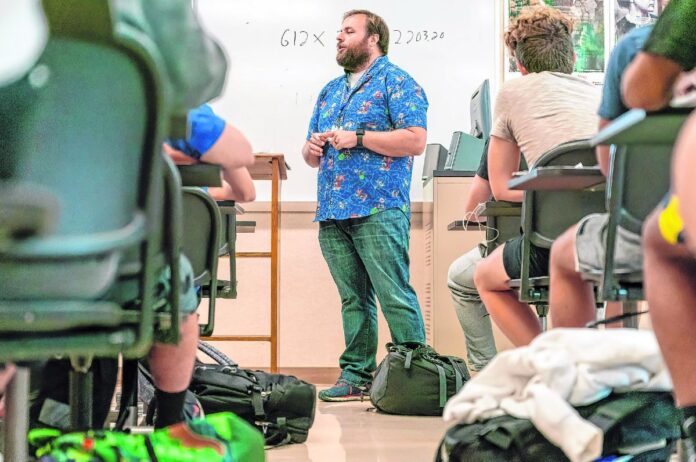None of today’s K-12 students were alive on September 11, 2001.
Most of their teachers, though, remember the day vividly.
Debora Yost, now a geography teacher at Whiteland Community High School, was teaching psychology at Twin Lakes High School in Monticello at the time. Indiana high school students were taking the ISTEP exam when hijacked airplanes struck the World Trade Center’s Twin Towers in New York City and The Pentagon in Washington, D.C., and crashed in a Pennsylvania field, acts of terrorism that sparked a 20-year War in Afghanistan, a war that just ended last week.
That morning, a neighboring teacher, who was typically a jokester, came running into Yost’s classroom yelling for her to turn on the TV, she recalled.
“He said, ‘America is being attacked.’ He was always playing practical jokes, so I said, ‘Oh sure, Mr. Wright.’ He said, ‘turn on the TV right now.’ We turned it on, and we sat there stunned,” Yost said.
Some of her students started crying, but she couldn’t let her emotions take over, so she kept it together, she said.
“Some of the boys said, ‘we have to do something.’ I knew right then some of the kids in the classroom would be signing up to go fight in the war. I grew up watching Vietnam, and I did not want to see that again,” Yost said.
Some of those students never returned home.
As a social studies teacher, Yost also teaches U.S history, world history, government and sociology. No matter the subject, on or around Sept. 11, she recounts what happened that day. Now, none of her students have living memories of it, but they are fascinated by her accounts of what happened, she said.
Over the years, as students’ knowledge of 9/11 changed, so did teachers’ lesson plans.
“I think it’s a different approach,” Yost said. “Most of them get interested when I’m talking about that day. I say, ‘this is my experience.’ I remember as a kid watching the Vietnam War on TV. We didn’t have social media. My entire elementary and middle school (life) was news, weather, sports and war. That was part of your life. A great thing is living through history, remembering it and telling people what it is about.”
It is more difficult to teach students about 9/11 when they have no memories of it, said Kathleen Sarles, a social studies teacher at Franklin Community High School.
“It was easier to teach when kids had working memories and it was an ongoing investigation,” Sarles said. “We had just begun the response in Afghanistan and then later on in Iraq. There was the daily tilt of successes and failures. It was more of a tactile experience because it was covered so regularly. Students experienced it in real time — on the news and in updates.”
Now, students look at it as they would any other historical event, such as the Civil War and Pearl Harbor, she said.
“There’s no visceral connection unless they lost a family member that day. The kids today are less emotionally connected to the event, even though it’s changed their world. I teach it more from a historical perspective. I focus more on a build-up about what terrorism is, where it originates from historically, and then look at terrorism as a global event,” Sarles said.
“It’s more than Al Qaeda. I run my personal experiences through it, talk about what the school went through.”
Because students today lack those personal connections to it, it is important to convey how the events shaped the country into what it is today, said John Butler, a social studies teacher at Indian Creek High School.
“I remember everything that happened. I could teach and reflect on it differently with kids because they were alive, especially the older ones,” Butler said.
“As I got older and the kids got younger … they know it’s important and a horrible thing that happened, but the aspect of history they’re learning and reading about in class, I have to work harder to convey the significance of what happened and how it changed the country culturally, economically and governmentally.”
Share your memories
This year marks the 20th anniversary of the Sept. 11 terror attacks. This week, the Daily Journal will publish a series of stories about 9/11, and we invite readers to share their memories about that fateful day.
Where were you that morning? What do you remember most about it? Share your stories with us in 200 words or less. We may include them in our package of coverage to be published on the anniversary Saturday.
You may email your stories to [email protected] by the end of the day Thursday.





